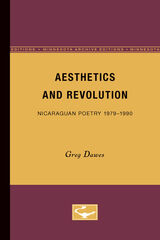
In Aesthetics and Revolution, Dawes demonstrates that there is an objective grounding for cultural studies found in the aesthetic means of production. By analyzing the relations and forces of production in this realm we inevitably cross over into the economic means of production as well as the struggle for political representation. Ultimately, aesthetics is at the intersection of class and gender interests and their struggle for hegemony.
In Aesthetics and Revolution, Dawes has chosen a group of writers of different theoretical sympathies, class, gender, and social positions to reveal the conflictual interests of the social classes and genders as a whole. Through close readings of their work, Dawes examines the thematic nodes that are expressed in positions as diverse as Ernesto Cardenal’s liberation theology, Pablo Antonio Cuadra’s populism, the campesino’s oral tradition, and Gioconda Belli’s erotic verses in relation to the changes taking place in revolutionary Nicaragua.
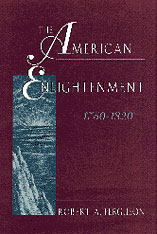


In the English response to the increasingly bloody French Revolution, Seamus Deane finds a new perspective on English political thought as well as a striking indication of the sharpening of national consciousness. Ranging widely among the major and lesser thinkers of the period, he has produced a complex picture of cultural affinity and national hostility. The group dominated by Edmund Burke, which included Southey, Wordsworth, and Carlyle, viewed the Revolution as the culmination of a great conspiracy, led by intellectuals, to overthrow all that was sacred and traditional. The radical group, led by Godwin, Shelley, and Hazlitt, welcomed the Revolution but were perturbed by its excesses.
The English debate about the French Revolution tended to focus on the specifically French characteristics that made it what it was, in sharp contrast to the culture and experience that produced the relatively peaceful English revolution of 1688. To see the Revolution as an essentially French phenomenon allowed it to be understood as alien to English circumstances and inclinations. This permitted the English to deny that its basic doctrines had any claim to universality and also led to an enhanced definition of the English national character. In his analysis of major writers, popular political novelists, and pamphleteers, Deane interprets the intellectual indebtedness of individual English writers to their French counterparts, reflects on the power of the written word to influence events, and dissects polemical styles and language. His book constitutes an important chapter of English intellectual history.

One of the best-educated of the colonialists, Odell, a physician turned Anglican minister and then writer, lived the gamut of experience: powerful friends sustained him and the British commanders-in-chief Sir William Howe, Henry Clinton, and Sir Guy Carleton employed him; nevertheless, during the war he was a lonely exile ("Tory hunters" forced him from his home in 1775), and, at the end of the war, when his hope for reconciliation between the Loyalists and the Americans came to nothing, he reluctantly emigrated to Canada.
Here is a voice, all but silenced for over two hundred years, that must now be heard if we are to better understand the American Revolution.


The period before 1917 was a brilliant one for Russian literature, marked by the innovations and experimentation of modernism. With the Bolshevik seizure of power, a parallel process of drastic social innovation and experimentation began. How did revolution in the arts and revolution in society and politics relate to one another? Victor Erlich, an eminent authority on modern Slavic culture, takes up this question in Modernism and Revolution, a masterful appraisal of Russian literature during its most turbulent years.
Probing the salient literary responses to the upheaval that changed the face of Russia, Erlich offers a new perspective on this period of artistic and political ferment. He begins by revisiting the highlights of early twentieth-century Russian poetry—including the works of such masters as Akhmatova, Mandelstam, and Pasternak—and goes on to examine the major prose writers of the first post-revolutionary decade. In an inquiry that ranges over poetry, criticism, and artistic prose, Erlich explores the work of, among others, Symbolists Bely, Blok, and Ivanov, Futurists Khlebnikov and Mayakovsky, Formalists Jakobson and Shklovsky, the novelists Pilnyak and Zamyatin, the short-story master Babel, and the humorist Zoshchenko. He delineates a complex and ambiguous relationship between Russian literary modernism and the emerging Soviet state.
Here, following the artistic experimentation and cultural diversity begun early in the century, we witness a trend toward regimentation and conformity as the literary avant garde's modus vivendi with the new regime becomes increasingly precarious. As this regime recedes into history, along with the passions and prejudices it aroused, the accomplishments and failures of writers caught up in its early revolutionary fervor can at last be seen for what they were. From a perspective formed over a lifetime of study of Russian literature, Victor Erlich helps us look clearly, judiciously, and deeply into this long obscured part of the literary past.
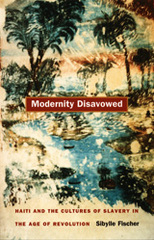
Fischer draws on history, literary scholarship, political theory, philosophy, and psychoanalytic theory to examine a range of material, including Haitian political and legal documents and nineteenth-century Cuban and Dominican literature and art. She demonstrates that at a time when racial taxonomies were beginning to mutate into scientific racism and racist biology, the Haitian revolutionaries recognized the question of race as political. Yet, as the cultural records of neighboring Cuba and the Dominican Republic show, the story of the Haitian Revolution has been told as one outside politics and beyond human language, as a tale of barbarism and unspeakable violence. From the time of the revolution onward, the story has been confined to the margins of history: to rumors, oral histories, and confidential letters. Fischer maintains that without accounting for revolutionary antislavery and its subsequent disavowal, Western modernity—including its hierarchy of values, depoliticization of social goals having to do with racial differences, and privileging of claims of national sovereignty—cannot be fully understood.
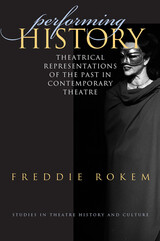



Approximately fifty historical novels dealing with the American Revolution were published in the United States from 1896 to 1906. Benjamin S. Lawson critically examines the narrative strategies employed in these works and the ways in which fiction is made to serve the purpose of vivifying national history.
Writing within the conventions of the historical romance, these authors created plots that reflect the enveloping concerns of the War for Independence, such as the young American woman who often must choose between suitors on opposite sides in the wider conflict.
Lawson concludes that these works reassured readers of the worth of an Anglo-American heritage. They were escapist fantasies to the degree that they failed to confront contemporary realities of crisis and change: the New Immigration, urbanization and industrialization, labor strife, the plight of the poor, and agitation on behalf of women and ethnic minorities.

Milton’s Great Poems—Paradise Lost, Paradise Regained, and Samson Agonistes—are here examined in the light of his lifelong commitment to the English revolutionary cause. The poems, Joan Bennett shows, reflect the issues Milton had dealt with in theological and public policy debate, foreign diplomacy, and propaganda; moreover, they work innovatively with these issues, reaching in epic and tragedy answers that his pamphlets and tracts of the past twenty years had only partially achieved. The central issue is the nature and possibility of human freedom, or “Christian liberty.” Related questions are the nature of human rationality, the meaning of law, of history, of individuality, of society, and—everywhere—the problem of evil.
The book offers a revisionist position in the history of ideas, arguing that Renaissance Christian humanism in England descended not from Tudor to Stuart Anglicanism but from Tudor Anglicanism to revolutionary Puritanism. Close readings are offered of texts by Richard Hooker, Milton, and a range of writers before and during the revolutionary period. Not only theological and political positions but also political actions taken by the authors are compared. Milton's poems are studied in the light of these analyses.
The concept of “radical Christian humanism” moves current Milton criticism beyond the competing conceptions of Milton as the poet of democratic liberalism and the prophet of revolutionary absolutism. Milton's radical Christian humanism was built upon pre-modern conceptions and experiences of reason that are not alien to our time. It stemmed from, and resulted in, a religious commitment to political process which his poems embody and illuminate.
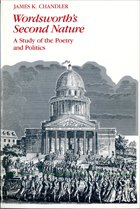
Central to the discussion, which restores Wordsworth to both the French and English contexts in which he matured, is a consideration of his relation to Rousseau and Burke. Chandler maintains that by the time Wordsworth set forth his "program for poetry" in 1798, he had turned away from the Rousseauist idea of nature that had informed his early republican writings. He had already become a poet of what Burke called "second nature"–human nature cultivated by custom, habit, and tradition–and an opponent of the quest for first principles that his friend Coleridge could not forsake. In his analysis of the poetry, Chandler suggests that even Wordsworth's most apparently private moments, the lyrical "spots of time," ideologically embodied the uncalculated habits of an oral narrative discipline and a native English mind.
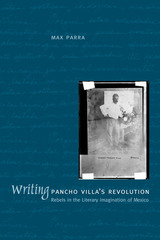
The 1910 Mexican Revolution saw Francisco "Pancho" Villa grow from social bandit to famed revolutionary leader. Although his rise to national prominence was short-lived, he and his followers (the villistas) inspired deep feelings of pride and power amongst the rural poor. After the Revolution (and Villa's ultimate defeat and death), the new ruling elite, resentful of his enormous popularity, marginalized and discounted him and his followers as uncivilized savages. Hence, it was in the realm of culture rather than politics that his true legacy would be debated and shaped.
Mexican literature following the Revolution created an enduring image of Villa and his followers. Writing Pancho Villa's Revolution focuses on the novels, chronicles, and testimonials written from 1925 to 1940 that narrated Villa's grassroots insurgency and celebrated—or condemned—his charismatic leadership. By focusing on works by urban writers Mariano Azuela (Los de abajo) and Martín Luis Guzmán (El águila y la serpiente), as well as works closer to the violent tradition of northern Mexican frontier life by Nellie Campobello (Cartucho), Celia Herrera (Villa ante la historia), and Rafael F. Muñoz (¡Vámonos con Pancho Villa!), this book examines the alternative views of the revolution and of the villistas. Max Parra studies how these works articulate different and at times competing views about class and the cultural "otherness" of the rebellious masses. This unique revisionist study of the villista novel also offers a deeper look into the process of how a nation's collective identity is formed.
READERS
Browse our collection.
PUBLISHERS
See BiblioVault's publisher services.
STUDENT SERVICES
Files for college accessibility offices.
UChicago Accessibility Resources
home | accessibility | search | about | contact us
BiblioVault ® 2001 - 2024
The University of Chicago Press









